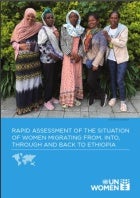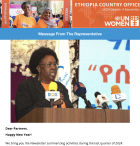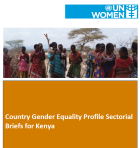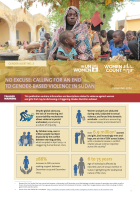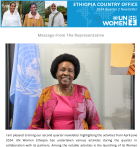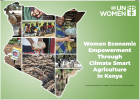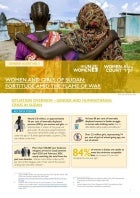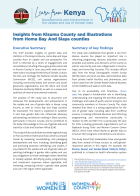Date:
Sudan is experiencing one of the world’s worst humanitarian crises, two years into a devastating conflict that has far-reaching regional implications. A major consequence is the large-scale displacement of people to neighboring countries, with projections estimating over 4.8 million displaced by the end of 2025 if the conflict persists. Conflicts like these typically worsen existing social inequalities, especially gender disparities. Even before the current crisis, Sudan and surrounding countries such as Chad, South Sudan, and the Central African Republic (CAR) ranked poorly on the Gender Inequality Index (GNI), with scores of 0.55 for Sudan, 0.59 for South Sudan, and 0.67 for both Chad and CAR. These figures reflect limited access to education, healthcare, and political participation for women. The ongoing conflict is expected to deepen these disparities, highlighting the urgent need for gender-responsive humanitarian strategies to ensure inclusive support, protection, and long-term development for affected populations across the region.
Date:
The rapid assessment provides an analysis of the situation of women migrating from, to through and back to Ethiopia based on existing literature and a review of relevant policies, legal frameworks and services related to migration governance in Ethiopia, with a gender lens. The assessment also proposes recommendations to strengthen the rights of migrant women at all stages of migration.
Date:
Drawing on the policy brief on advancing the rights of Ethiopian migrant women domestic workers the infographic illustrates the risk and realities facing Ethiopian women migrating for domestic work at all stages including pre-departure, during the journey, at country of destination and upon return and provides insights for action.
Date:
Happy New Year!
We bring you the Newsletter summarizing activities during the last quarter of 2024. As we gear towards continuing our work of empowering women and girls with a renewedspirit for 2025, we reflect on how 2024 has been for GEWE work. At UN Women EthiopiaCountry Office, we concluded the year with a vibrant commemoration of 16 Days of activism.The annual Unite Campaign brought together government entities, sister UN Agencies, CSO,Women Led organizations among others. It was yet another opportunity to collaborate andrenew commitment to work for betterment of the lives of women and girls in Ethiopia.
Date:
These policy briefs, form part of the Country Gender Equality Profile (CGEP), evaluates gender equality in Kenya, offering evidence-based insights for stakeholders to advance commitments to Gender Equality and Women’s Empowerment (GEWE). Guided by the EU Gender Action Plan 2021–2025, they promote inclusive, transformative approaches to inform programmes, policies, and actions, addressing diverse gender needs and advancing Kenya’s Sustainable Development Goals (SDGs) through national and county-level collaboration.
Date:
Discover the key insights and milestones of the Beijing Declaration and Platform for Action (BPfA) as we approach its 30th anniversary in 2025. This publication explores progress made, persistent challenges, and Kenya’s contributions to gender equality. Highlighting actionable steps for individuals and organizations, it connects the BPfA to the Sustainable Development Goals, emphasizing its continued relevance in driving transformative change for women and girls globally.
Date:
More than 11 million people have been displaced amid the conflict in Sudan as of October 2024, with more than half (54 per cent) being women and girls. An estimated 12 million people are currently at risk of gender-based violence, as described in this new Gender Alert by UN Women.
Date:
We are bringing the third quarter newsletter to you, filled with events in our Country office, some impact stories, and new publications. Speaking of events, at the end of this quarter, we were busy planning to host a senior leader from UN women Head Quarters, hence the delay in sharing this newsletter to add this important engagement.
We were honored to host Dr. Nyaradzayi Gumbonzvanda, Deputy Executive Director for Normative Support, UN System Coordination and Programme Results. The visit by DED Nyaradzayi Gumbonzvanda marked a pivotal opportunity to reinforce and strategically align the partnership between UN Women and Ethiopian government and CSOs as well as between UN Women, the African Union Commission (AUC), and UNECA and UN sister agencies.
Date:
The UN Women Kenya Annual Report highlights key achievements in advancing women’s empowerment and gender equality.
This report showcases progress in increasing women’s leadership and political participation, strengthening economic empowerment, eliminating violence against women and girls, engaging women in peace and security efforts, and enhancing planning and coordination.
UN Women Kenya remains dedicated to building a future where women are at the heart of developing resilient and sustainable communities.
Date:
Ethiopia has demonstrated thought leadership in the use of gender data to meet national priorities and address gaps to achieve these as well as SDG targets on gender equality and women’s empowerment (GEWE) and others. Gender data has notably been used to improve and safeguard education opportunities for girls, boost agriculture and productivity, particularly for female-headed households including through addressing land ownership, and to address issues of gender-biased violence.
Date:
UN Women Ethiopia has undertaken various activities during the quarter in collaboration with its partners. Among the notable activities is the launching of its WomenEconomic Empowerment Strategy. The strategy encapsulates UN Women’s vision of empowering women to thrive and economies to prosper. It aims to dismantle the systemic barriers that prevent women from fully participating in the economy.
Another important work done during the quarter is the continuation of our effort to ensure the participation of Civil Society organizations in the transitional justice processes. To this end, a two-day national workshop on creating space for the CSOs to participate in the implementation process of transitional justice policy in Ethiopia was held in June 2024. The workshop targets women leaders from non-governmental and CSOs and representatives of grassroots community groups aimed to assess gender sensitivity of the Transitional Justice (TJ) Policy recently adopted by Ethiopia’s Council of Ministers.
Date:
The WEE-CSA Storybook showcases the success stories of over 2,400 women from Kitui, Laikipia, and West Pokot who have transformed their lives through climate-smart agriculture. Funded by KOICA and implemented by UN Women Kenya, it highlights the project's impact on livelihoods and gender equality while sharing valuable lessons learned. This collection celebrates resilience and aims to inspire further community upliftment for sustainable development in Kenya.
Date:
This is a condensed version of the manual titled “Gender- Responsive Unpaid Care and Domestic Work Advocacy Guideline,” developed by UN Women in partnership with the Ministry of Women and Social Affairs, Ethiopia Country Office. The primary aim of this advocacy guideline is to promote gender-transformative actions addressing unpaid care and domestic work (UCDW). It emphasizes the need for increased investment in the gender-responsive care economy to advance the social, economic, and political empowerment of women and girls, thereby contributing to sustainable development.
Date:
This is an abridged version of the manual “Gender Mainstreaming in Agriculture: Training of Trainers Manual,” emerging from UN Women Ethiopia’s Women Economic Empowerment Program, in collaboration with the Ministry of Agriculture. It is funded by UN Women’s Strategic Note (2021-2025) donors: the Government of the Netherlands, the Government of Norway, and the Government of Sweden. This manual attempts to address this gap by formulating modules and sessions on relevant topics. Creating gender awareness and building agricultural gender analysis skills among agricultural, land, gender, and other related professionals and planners can contribute to gender mainstreaming in the sector, consequently leading to the equitable participation, contribution, and benefit of female farmers in the Ethiopian agriculture sector.
Date:
This is an abridged version of the manual titled ‘Unpaid Care and Domestic Work Training of Trainers’ Manual developed by UN Women in collaboration with the Ministry of Women and Social Affairs, Ethiopia Country Office. The objective of the manual is to introduce and investigate the concept of unpaid care and domestic work (UCDW). It makes a significant contribution to the contemporary discussion and debate on UCDW issues and how they affect women’s social lives and economic empowerment. Through training, it is hoped to build a pool of partnerships to influence the national government, communities, and other stakeholders to better recognize the role of care work in the economy, to empower stakeholders to advocate for a more equitable distribution of care responsibilities and greater support for caregivers by addressing the gender gap that results from a lack of awareness and appreciation of unpaid care and domestic work (UCDW).
Date:
This publication provides a detailed analysis of the ongoing humanitarian crisis in Sudan, focusing on its disproportionate impact on women and girls. As the country faces the largest internal displacement since the Syrian civil war, millions of Sudanese, particularly women and children, are grappling with severe challenges.
Date:
Kenya has demonstrated thought leadership in the use of administrative and citizen data for statistical purposes and harnessing official data to meet national priorities and SDG targets including on gender equality and women’s empowerment. This product highlights tangible achievements and lessons in improving access to and use of this data to influence policy and decision-making and improve the lives of women and girls in Kenya.
Date:
Accessing accurate information on and services for regular migration is not easy; Ethiopian women may rely instead on informal networks and unregistered recruitment agencies. Ethiopian migrant women travelling via irregular overland routes, as opposed to travelling by plane, face high risks of sexual and gender-based violence, including trafficking for forced labour and sexual exploitation. Upon reaching their destination countries and taking up domestic work, they often face abusive and exploitative situations. Health issues, including physical injuries and high rates of suicide, are widespread among Ethiopian migrant women domestic workers. Despite these harsh realities, some women secure relatively high salaries in comparison to those in Ethiopia and send significant portions of their salaries home to support their families. Upon returning to Ethiopia, many women face stigma, limited economic opportunities and psychological distress. Limited gender-responsive reintegration support further complicates their efforts to rebuild their lives and attain economic independence.
Date:
The ultimate goal is that women and girls in Sudan benefit from gender-responsive humanitarian action and targeted assistance that responds to their basic needs, and from opportunities for their meaningful participation in peace, political and humanitarian processes.
Date:
Following the tragic landslides in Gofa Zone (21-22 July 2024), an estimated 14,000 people are affected, including those displaced and those living in at-risk areas requiring evacuation. An emergency response has been launched by the Federal Government in partnership with local communities and humanitarian actors. Women and girls are particularly vulnerable and disproportionately affected by the crisis. They may face gender-related barriers in accessing assistance and their needs may be overlooked if gender is not mainstreamed in the response. In consultation with the national Gender in Humanitarian Action WG chairs and cochairs, the PSEA IA Coordinator, the AAP Coordinator, this document seeks to highlight actionable gender-related recommendations for humanitarian stakeholders/actors involved in the response to the landslides.


